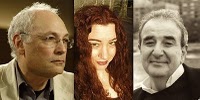Wallace Stevens, 'Not Ideas about the Thing but the Thing Itself'
LISTEN TO THE SHOW
 PoemTalk listeners will want to stick around for the end of this show in particular, when Nada Gordon, a first-time PoemTalker, recites her flarfistic rewriting of Wallace Stevens’ late poem, “Not Ideas about the Thing but the Thing Itself.” Meantime, of course, we give the poem a good going-through. The talkers this time, beside Nada, are Lawrence Joseph and Charles Bernstein, and we were (for the first time in PoemTalk’s short history) on the road, at Studio 92 on the Upper West Side of Manhattan.
PoemTalk listeners will want to stick around for the end of this show in particular, when Nada Gordon, a first-time PoemTalker, recites her flarfistic rewriting of Wallace Stevens’ late poem, “Not Ideas about the Thing but the Thing Itself.” Meantime, of course, we give the poem a good going-through. The talkers this time, beside Nada, are Lawrence Joseph and Charles Bernstein, and we were (for the first time in PoemTalk’s short history) on the road, at Studio 92 on the Upper West Side of Manhattan.
Anyone who deals with this poem has to understand the rhetorical gist of Stevens's “like”: the cry he thinks he hears seemed “like” a sound in his mind; it was “like” a new knowledge of reality. Charles half-jokes that it’s anachronistically (and uncharacteristically) a 1960s like: a cool “very,” an intensifer, a pause. Al tries to stipulate that this is a Keats-at-the-casement poem: he’s inside, looking out and hearing minimal late-winter birdsong. But Larry believes firmly in the radical open-ness of this poem: we are neither inside nor out. There is no conventional place of standing. “Three times in the poem,” Nada has written elsewhere, “he says the sound was coming ‘from outside.’ But I don’t believe him. How can I believe this from a poet whose ‘actual candle blazed with artifice’?”
 This was certainly the threesome, too, to say interesting things about the alphabetical “c” that precedes the choir.
This was certainly the threesome, too, to say interesting things about the alphabetical “c” that precedes the choir.
Our recording comes from the wonderful collection of recordings at the Woodberry Poetry Room at Harvard, and we wish to thank Don Share, Christina Davis, Peter Steinberg, and others who have taken such good care of that material. Stevens traveled to Harvard to record this poem on October 8, 1954 (he died in 1955).
February 3, 2009
New writing practices at Banff
Julia Bloch and Sarah Dowling are taking good notes on everything and intend to write an article. Steven Ross Smith, organizer, says he will get us recordings so that we can put a selection on PennSound.